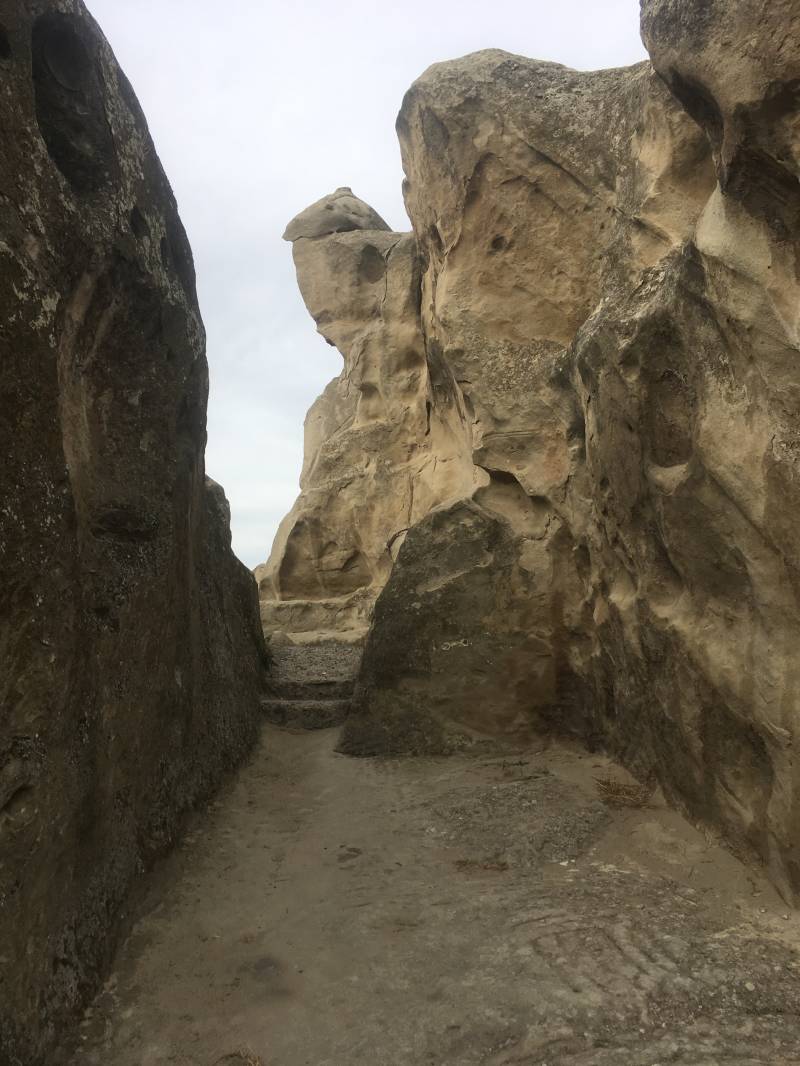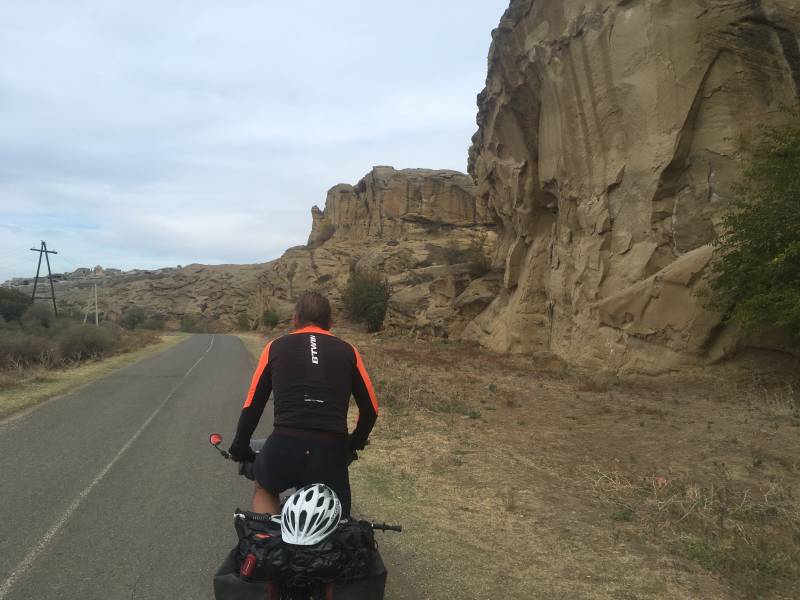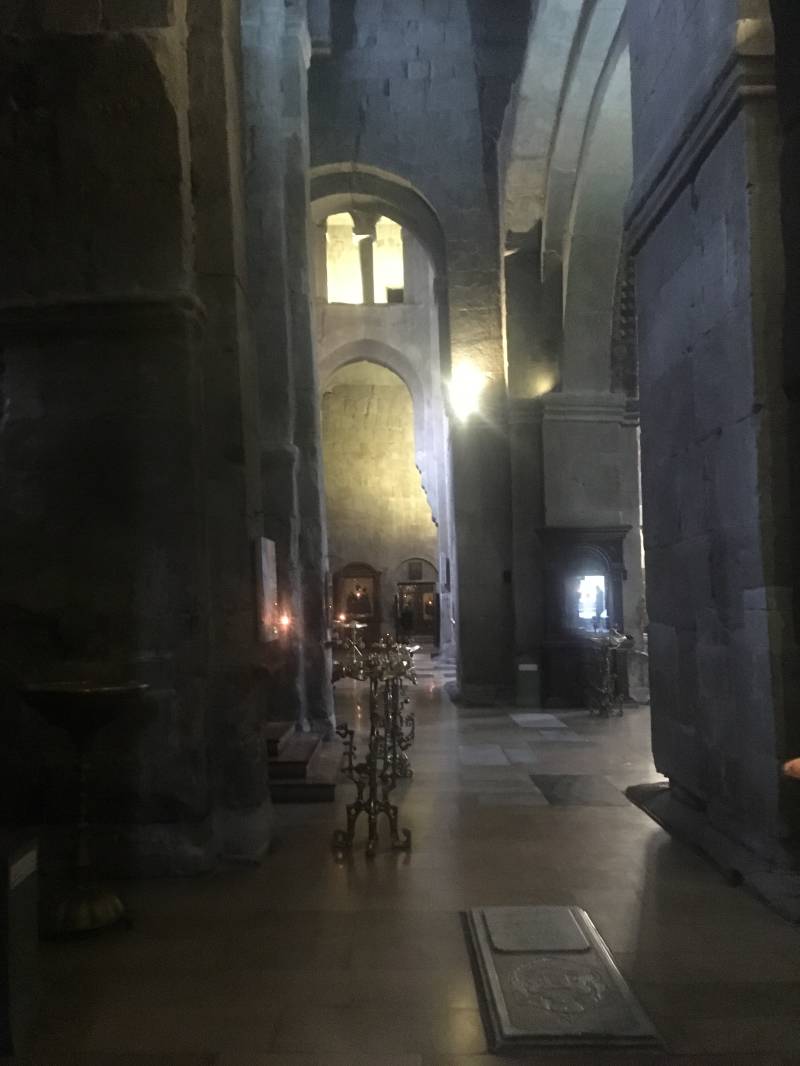
The last part of our route through Georgia takes us from Kutaisi to the capital Tbilisi via all kinds of back-roads. We leave the high Caucasus definitively, even though we continue to see the mighty peaks for days. We are looking forward to Tbilisi, but less in the way there. We expect a number of boring stages. Fortunately, this expectation did not come true.
Ivan has tipped a new route app, which didn't send him over meadows or end up on cow paths: Mapy.cz. We're going to try it today. Already in Kutaisi it goes wrong. The street we need to take is closed due to road works. Of course, Mapy.cz could not know that. We cycle back to the S14 that leads to Borjomi NP. We have rode it in the opposite direction 10 days ago. This time we leave the road just south of the city and turn into a dirt road. Soon there is nothing left to be seen of the wash of the bikes in Kutaisi. But the road is fine.
A farmer with a flapper hat has just jumped on his bike and is happily challenging us on speed. He sadly loses his hat and loses the challenge. Moments later, a boy riding on a horse joins in on the road with his dog. His dog is directly attacked by a few farm dogs . Fortunately, the dogs do not attack us. Perhaps handy to ride with this pack together with a horse and a dog and their owner. We drive up for a couple of kilometers until his dog becomes increasingly annoying and occasionally snaps at our calves. The young cowboy calls his dog to correct, but the dog does not listen or reacts. We stop and let them go.
In Zestaponi we buy a bread from the tandoori oven. You get bread on a piece of paper. We buy only one, but many walk away with a pile of bread balancing on still that one piece of paper. The bread just comes out of the oven and in the shortest time is halved.


In Zestaponi we briefly cycle on the highway. In a few kilometers we pass an infinite number of restaurants, cafes and coffee shops. It's like a busy horeca street.
After the plain, as usual, there is more hilly section coming up. We get in to rougher rocky green hills, where the village of Khasguli is in between. After a few weeks in Georgia, we still long for the heart-warmed hospitality of Turkey. In Georgia (almost) everyone looks surly and indifferent. Drivers honking their horns, but only to let us know that they are approaching and that we can better get out of the way. Many cars drive without bumpers and with heavily cracked windshields. Half of the cars has the steering wheel on the right and the other half on the left. We see several former Dutch vans driving: 'De Ploeg' from Helmond brings house wine around, 'Aluminium Kozijnen' from Posterholt is now a marshrutka (minibus for passenger transport) and 'Dr Diamond' for all kinds of children's parties now works in construction.
The village Khasguli has a hotel and there is a telephone number on the door. There is no one inside. Fortunately, the owner just arrives. He does not speak English. A phone call would probably be a difficult session, but with sign language and google translate we check in. He points to a café under the hotel where we - if we understand the sign language well - could also eat something. After a shower we walk in the direction of the train station and find out that this is a meaningless village with a lot of supermarkets which all offer a very limited range of products. When we get back to the cafe under the hotel the lights are out and we ask a passerby if somewhere something can be eaten in this town. He is pointing back in the direction of the station. A mini-shop has a few tables and chairs inside. There is no menu. There is one option for food: Chatsjapuri, cheese bread and one option for beer: Dutch Bavaria. We are the only guests in the only 'restaurant' of the town. The next morning the fruit stall is still closed and we have breakfast with bread and salty white cheese.
Immediately outside the village, the asphalt disappears under the wheels and we cycle on an unpaved road full of potholes and stones. There is a railway line running past us. The route is pretty fun. The villages look deserted and from another bygone decade. We have heard that in recent times many Georgians opt for a future outside of Georgia. Of the previous 5 million, the country now counts 4 million inhabitants.

When we get asphalt under the wheels again at the end of the day, we cycle on the highway through the city of Surami, which flows over into the city of Khashuri. Along side of the road there are about 200 stalls that all sell exactly the same: nazuki, sweet cinnamon bread and they all advertise with the excact same 'offer': 5 cinnamon rolls + 1 bottle of water. Occasionally the cinnamon loaves can be seen, but the majority of the stalls show the merchandise in a stone version. It Ain't big business. Everyone drives past the stalls, like we do to.
In Khashuri we accidentally cycle past the center. There is actually almost no center. What we find at the other side is a very popular kebab dinner. It may be too early to eat, but we decide to taste what is so popular and wait a while before our order is ready. After a big and very tasty wrap dönner we cycle to a guest house. The street of the guest house is a typical Georgian street: unpaved with cows and pigs droppings and high walls and fences on both sides that hide large houses with ditto gardens and from where a angry dog barks. Our hostess speaks almost no English and calls her daughter, whom is in Barcelona, to speak with us. The harvest is processed in and around her house. On the table apples and pears are drying and there are mega jars in the kitchen with sprouts, cauliflower and much more.
The breakfast is a bit pricey at this guest house and that's why we buy ourselves bread, cheese and yoghurt. We ask for coffee, as her daughter told us. After a while the hostess signals that the coffee is ready in the kitchen. There are two small porcelain cups with sweetened coffee and a thick layer of drab at the bottom: yep Turkish coffee. Next to it is a plate of peeled apple and pear parts, a bowl of honey and a bowl of walnuts and that turns out to be exactly the ingredients to prepare a delicious breakfast. Culinary highlight in Georgia: a cheese, pear, honey & walnut sandwich. Perfect compensation for the terrible coffee.
The road from Khashuri to Gori is boring. It is also cold and rain is forecast for the afternoon. We set off on good asphalt roads. Mapy.cz offers us a short cut that initially leads us over a good asphalt road, but then in a dirt track between houses and then into the wide field. Unfortunately, Mapy.cz can also send you to non-existent paths. The cart track we follow is littered with gigantic snails. Eventually we'll get back on the route. Luckily no need to cycle back.
In Gori we see dark clouds gathering above our heads. We decide not to visit the birthplace of Stalin and the city, where a five-day war took place in 2008 and cycling to a village further on to Gogi's wine cellar & guesthouse. Gogi serves us a nice dinner in the evening with wine tasting and with a bottle of the nicest wine we retire in to his beautiful guest house.
From Gogi's guest house it is a mere 10 kilometers to Uplistsikhe, an ancient cave town, where 20,000 people once lived, but has been abandoned since the Middle Ages. We arrive just before the opening time and are therefore the first and long time only visitors to the deserted city.





In order to return from Uplistsikhe to the asphalt road, we arrive at a flooded railway tunnel. We do not dare to cycle through and push the bikes up the steep slope and over the rails. The asphalt road and the route are beautiful and the sun is shining again.
The route ends today in Mtsketa. The name is difficult to pronounce. The city is beautiful. It was in ancient times the capital of the Caucasian Iberia and it has beautiful monuments including an old cathedral in the middle of the old village. The story about the construction of this monument tells us the following: a soldier has taken the chiton (sacred tunic) of Jesus to Mtsketa. His sister Sidonia died immediately when she touched the chiton and was buried in it, because they could not release her from the chiton. A cedar was planted on her grave. In the Middle Ages, the cedar was cut down and 7 pillars were made to build a cathedral there. The seventh pillar did not want to come into its place. Saint Nina (project manager of building the cathedral) prayed all night so hard that the last column without human contact slid into place. This last pillar is called the 'Life creating pilar' and has performed many wonders.

In the guest house we can use the kitchen and cook our own pasta and drink the delicious home-made wine (of course in a 2nd (?) hand plastic bottle. The hostess serves a lavish breakfast in the morning and after breakfast we visit the cathedral to admire the Life creating pillar. Once again it is nice and quiet so early in the morning. No groups of Asian tourists with selfie sticks at this hour. Only a few monks and some praying locals in this special and impressive house of faith.



The route to Tbilisi is short and becomes busier and busier as we cycle into the city. We have stepped into a time machine: the decades backlog has been eliminated. Expensive cars speed trough the city, full of modern architecture, high-rise buildings and all kinds of shops and fancy restaurants. We cycle to an apartment that we have booked for 5 nights. We are a little too early and plop down at a terrace nearby the apartment. We get into conversation with the neighbors. They turn out to be Turkish expats and we tell them how much we liked Turkey. Instagram addresses are soon exchanged. Then it's time to get the key of the apartment and we step across the threshold of a very tastefully decorated apartment: "your cozy home". The name could not have been chosen more accurately.
Winter is coming. As we have mentioned before, we will not let us rush through this dream that we are living with each other. The consequence is that we must skip Azerbaijan, Kazakhstan and Uzbekistan. But the drizzle of Turkish coffee has predicted that after this trip around the world, we will go on new adventures six times, so that will probably work out well. For now: nice to have a home in a lively city after 4 months of traveling. From here we will arrange the flight to Nepal and the further journey, cleaning everything and washing and especially relaxing. Fancy!

